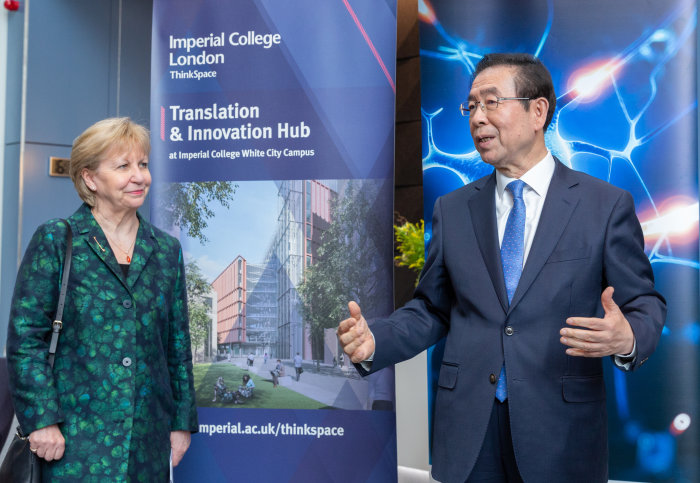Mayor of Seoul forges new bioscience ties in White City

One of Asia’s most important leaders Park Won-soon, Mayor of Seoul, visited Imperial’s White City Campus as UK-Korea scientific connections grow.
London and Seoul are to expand their partnership in the biosciences as Mayor Park signed an agreement between the UK and Korean capitals at Imperial’s I-Hub in White City.

Imperial’s Vice President (International) Professor Maggie Dallman took Mayor Park on a tour of the I-Hub, where he saw the rapidly developing innovation cluster in action.
Speaking at the event, Professor Dallman said: “The key thing we’re doing is bringing people together from different disciplines and departments and communities.
"The mix of academic, commercial and business can be very powerful in solving global problems.”

The Mayor spoke about the desire to enhance collaboration between Imperial and London with Seoul and Korea. The Mayor also spoke about the importance of health data, which is central to the research agenda in London and Seoul.
Director of Enterprise, Simon Hepworth, explained why businesses, such as Novartis, are attracted to White City and how its environment is helping start-up companies, such as Customem and DNA Nudge, to develop and grow their businesses there.

The Korean delegation met Imperial academics and startup founders from Sixfold Bioscience – which develop safe and effective drug delivery systems for cell and gene therapeutics.
The Mayor was particularly interested in hearing about what Imperial is doing to develop incubation and bioscience, which are at the top of his agenda.

The Mayor then met some of Imperial’s South Korean biochemistry students. Student Bowon Yoo, who shared a warm embrace with the Mayor, said that the Mayor was an inspiration because of his human rights work.

Mayor Park had met his London counterpart Sadiq Khan, Mayor of London, earlier in the day. Mr Khan recently visited White City to open Imperial’s Molecular Sciences Research Hub - a new £167m building which brings together 800 scientists, clinicians, engineers and business partners under one roof.
South Korean links

Imperial has exceptionally strong ties with Korea, with College academics publishing more than 290 research papers with their peers at Korean institutions every year.
Imperial is also home to 200 South Korean students and has more than 400 alumni in the country.
Recent collaborations together include a satellite project which involved attaching tiny sensors for measuring the Earth’s space weather environment – built by Imperial scientists – to a South Korean satellite, which was launched last year.
Teams from Imperial the Korea Advanced Institute of Science and Technology (KAIST) also equipped a drone with a new algorithm to herd birds without human input, saving aeroplanes and birds alike.
Article text (excluding photos or graphics) © Imperial College London.
Photos and graphics subject to third party copyright used with permission or © Imperial College London.
Reporter
Stephen Johns
Communications Division
Thomas Angus [Photographer]
Communications Division
Andrew Scheuber
Communications Division